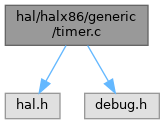#include <hal.h>#include <debug.h>
Go to the source code of this file.
Macros | |
| #define | NDEBUG |
| #define | PIT_LATCH 0x00 |
Functions | |
| FORCEINLINE ULONG | HalpRead8254Value (void) |
| VOID NTAPI | HalpSetTimerRollOver (USHORT RollOver) |
| VOID NTAPI | HalpInitializeClock (VOID) |
| VOID NTAPI | HalCalibratePerformanceCounter (IN volatile PLONG Count, IN ULONGLONG NewCount) |
| ULONG NTAPI | HalSetTimeIncrement (IN ULONG Increment) |
| LARGE_INTEGER NTAPI | KeQueryPerformanceCounter (PLARGE_INTEGER PerformanceFrequency) |
Macro Definition Documentation
◆ NDEBUG
◆ PIT_LATCH
Function Documentation
◆ HalCalibratePerformanceCounter()
Definition at line 212 of file timer.c.
◆ HalpInitializeClock()
Definition at line 92 of file timer.c.
◆ HalpRead8254Value()
| FORCEINLINE ULONG HalpRead8254Value | ( | void | ) |
Definition at line 35 of file timer.c.
Referenced by KeQueryPerformanceCounter().
◆ HalpSetTimerRollOver()
Definition at line 53 of file timer.c.
Referenced by HalpInitializeClock().
◆ HalSetTimeIncrement()
◆ KeQueryPerformanceCounter()
| LARGE_INTEGER NTAPI KeQueryPerformanceCounter | ( | PLARGE_INTEGER PerformanceFrequency | ) |
Definition at line 255 of file timer.c.
Variable Documentation
◆ HalpClockSetMSRate
| BOOLEAN HalpClockSetMSRate |
Definition at line 25 of file timer.c.
Referenced by HalSetTimeIncrement().
◆ HalpCurrentRollOver
| ULONG HalpCurrentRollOver |
Definition at line 27 of file timer.c.
Referenced by HalpInitializeClock(), and KeQueryPerformanceCounter().
◆ HalpCurrentTimeIncrement
◆ HalpLargestClockMS
| ULONG HalpLargestClockMS = 15 |
Definition at line 29 of file timer.c.
Referenced by HalpInitializeClock(), and HalSetTimeIncrement().
◆ HalpLastPerfCounter
| LARGE_INTEGER HalpLastPerfCounter |
Definition at line 22 of file timer.c.
Referenced by KeQueryPerformanceCounter().
◆ HalpNextMSRate
| ULONG HalpNextMSRate = 14 |
Definition at line 28 of file timer.c.
Referenced by HalSetTimeIncrement().
◆ HalpPerfCounter
| LARGE_INTEGER HalpPerfCounter |
Definition at line 23 of file timer.c.
Referenced by KeQueryPerformanceCounter().
◆ HalpPerfCounterCutoff
◆ HalpRolloverTable
|
extern |
Definition at line 15 of file clock.c.
Referenced by HalpInitializeClock(), HalpInitializeClockPc98(), and HalSetTimeIncrement().